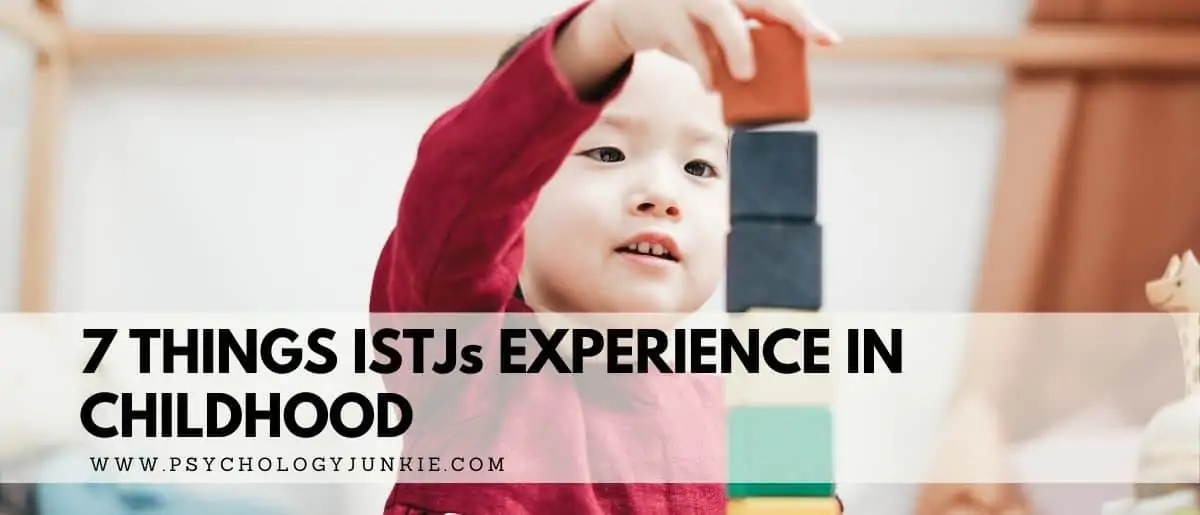7 Things ISTJs Experience in Childhood
Think you might be the parent of an ISTJ child? Maybe you’re an adult ISTJ and you’d like to get a better understanding of your childhood experience! Either way, today’s article is going to give you a deep-dive look at some of the unusual experiences of ISTJ children.
Not sure what your personality type is? Take our new personality questionnaire here. Or you can take the official MBTI® here.

Estimated reading time: 5 minutes
What is an ISTJ?
An ISTJ is one of the 16 personality types in the Myers-Briggs® system.
I stands for Introvert. ISTJs feel refreshed and recharged by the inner world of thoughts, ideas, and reflections.
S stands for Sensor. ISTJs focus on real, concrete, tangible details over abstract data.
T stands for Thinker. ISTJs prefer to focus on the impersonal logic involved in a decision before focusing on the personal criteria.
J stands for Judger. ISTJs like having a clear plan, structure, and routine. Knowing what to expect is crucial for ISTJs.
7 Things ISTJs Experience in Childhood
#1 – A Desire to Watch First and Interact Second
Young ISTJs are extremely observant children. Don’t let their quiet demeanor make you think that they’re not paying attention! To the ISTJ, it’s important to take in all the details of a situation before acting or getting involved. These types hate nothing more than to be shoved head-first into a situation they haven’t observed and prepared for first.
#2 – A Deep Need for Alone Time
Young ISTJs need a great deal of time alone to recharge and reflect. They love independent play, whether that means building with Legos, reading books, or riding a bike in the neighborhood. Peaceful moments alone help them to feel that life is worth living and rich with reflection, musing, and discovery. A lot of noise, interruptions, and socializing will make the young ISTJ feel like the walls are closing in on them, so it’s crucial to be compassionate towards this need.
#3 – Intense Powers of Concentration
ISTJs don’t want to just skate over the surface of something they’re interested in. They want to dive deep and learn all there is to know. If a young ISTJ is interested in insects, for example, they’ll probably read everything there is to read on the subject and spend their spare moments quietly searching for new creatures to observe and collect. Academically ISTJs are often competitive, and they can quickly shut out everything else to dig thoroughly into their studies. Whatever ISTJs do, they do it with their full focus and find distractions or multi-tasking irritating.
#4 – An Inclination to Solve Problems
To the young ISTJ, words only go so far. Action is the meaningful thing. When ISTJs care about someone, they want to fix things for them. They especially love being given a specific problem by an adult that they can research and solve. Being trusted, needed, and respected for their expertise is something that ISTJs crave deeply. If you are the parent of an ISTJ, don’t give them bombastic praise for a very basic task. Instead, show them respect by asking their opinion and really listening.
#5 -Feeling Like an “Old Soul”
ISTJs have highly personal perceptions of the world around them and crave depth of knowledge over breadth of experience. They often feel and consider things more deeply than anyone realizes. Because of their introspective, responsible nature, they often don’t relate to the “flightiness” and hyperactivity of many other children. Many ISTJs recall feeling much older than their years and more aware of the logical consequences of things than their fellow playmates.
#6 – A Need for Routine
A.J. Drenth, author of “The 16 Personality Types: Profile, Theory & Type Development” says of ISTJs: “ISTJs grow attached to the routine and familiar. The more often they do something in a particular way, the harder it is for them to break out of that pattern.” ISTJs feel best when they know what to expect and what the agenda is for any given day. A routine that changes from one day to the next causes them stress and can make them irritable. ISTJs with perceiving parents can feel overwhelmed by the spontaneous, ever-changing nature of day-to-day events.
#7 – Sensitivity to Sensory Input
ISTJs have an intensive awareness of inner-body sensations and how the physical world impacts them. They are typically hypersensitive to things like lighting, temperature, noise, and even flavors. They are probably the first to notice when milk is starting to sour, when it’s going to rain, or when they feel thirsty, ill, or fatigued. They may be able to pinpoint physical discomfort down to the most particular detail.
What ISTJ Children Need:
- Opportunities to prove their competence and knowledge
- A sense of routine in their daily life
- Respect for their privacy and alone time
- Rules explained in a direct, clear, logical fashion
- Clear, sequential explanations with schoolwork
- A chance to observe new situations before jumping into them
- Parents who will listen to them discuss their favorite interests
What Are Your Thoughts?
Do you have any input or insights? Let us know in the comments!
Find out more about your personality type in our eBooks, Discovering You: Unlocking the Power of Personality Type, The INFJ – Understanding the Mystic, and The INFP – Understanding the Dreamer. You can also connect with me via Facebook, Instagram, or Twitter!
Other Articles You Might Enjoy:
12 Amazing Fictional ISTJ Characters
24 Signs That You’re an ISTJ, the Detective Personality Type









